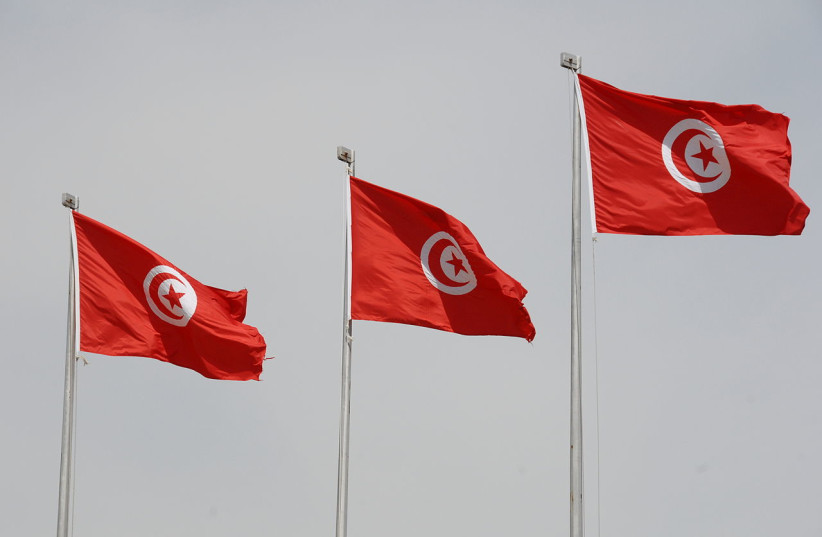Tunisia’s opposition alliance called for the country’s President Kais Saied to “immediately” resign a day after legislative elections were held on Saturday. The elections were boycotted by most of the opposition parties, resulting in the lowest turnout in the country’s history with just 8.8% of the country’s 9.2 million eligible voters participating.
For more stories from The Media Line go to themedialine.org
All 161 seats in Tunisia’s unicameral parliament, the Assembly of the Representatives of the People, were up for election. The results will not be announced until January 19, but given the opposition parties’ boycott, a victory for Saied’s supporters is inevitable. This victory will empower the president to pass the economic legislation needed to comply with controversial requirements set by the International Monetary Fund (IMF) as a condition for granting Tunisia a vital loan.

The IMF announced in October an agreement to lend Tunisia $1.9 billion to counter deteriorating economic conditions in the country. However, as part of the agreement, the Tunisian government will be obligated to decrease public spending, reform taxation, and revise the governance of public services and state-owned enterprises, among other reforms that are likely to impact the citizens’ pockets. Due to these austerity measures, most of the population,
as well as the Tunisian General Labor Union that once supported Saied, oppose the deal. The low turnout in the election was caused by both the success of the opposition groups’ boycott and a serious lack of information about individuals contesting them, says Abdullah Khurram, head of MENA analysis at Torchlight.AI, a behavioral intelligence platform designed to predict and mitigate emerging political risks.
“This was in fact the lowest turnout of any election in modern history, even lower than 18% in 2015 in Haiti and 19% in 2019 in Afghanistan, hence casting serious doubt on the legitimacy of the election."
Abdullah Khurram
“This was in fact the lowest turnout of any election in modern history, even lower than 18% in
2015 in Haiti and 19% in 2019 in Afghanistan, hence casting serious doubt on the legitimacy of the election,” Khurram told The Media Line. Jack A. Kennedy, a research and analysis associate director covering the Middle East and North Africa desk of the S&P Global Market Intelligence Country Risk and Forecasting team, told The Media Line
that Saied’s critics could try to use the low turnout to delegitimize his administration. However,
“the electoral turnout has been on a downward trajectory in Tunisia and has been a hallmark of
Saied’s political project,” with no damage to his rule thus far.
Kennedy adds that as long as Saied retains the support or control of the security forces, legislature, and judiciary, calls for him to resign will have limited impact. Khurram points out that in July when the opposition boycotted a referendum on the new constitution with the same intention and obtained a low turnout of 30%, the boycott did not prevent the constitution from being enacted.
“The opposition largely boycotted the constitutional referendum and that had a minimal impact on Saied’s political project and efforts to secure the International Monetary Fund’s support,”
Kennedy said, adding that on the contrary, “it contributed to greater exclusion from any influence over the process.” With the likely overwhelming victory of candidates supportive of his political project, Saied is effectively in control of the main levers of government now, says Kennedy. He argues that the victory in the legislative elections, in concert with the new electoral law, “is likely to strengthen his capacity to introduce legislation through parliament, including those related specifically to International Monetary Fund recommendations.”
The newly reformed constitution grants the president sole powers to introduce economic legislation, as required by the IMF, subject to its ratification by parliament, which will become even more likely as a result of this election, Kennedy explains. “The key factor here is going to be the extent to which Saied is able to implement economic structural reforms as mandated by the IMF, and the extent to which that can be carried out without provoking large-scale industrial unrest,” he adds. The reaction to the new Finance Law due to be published next week, says Kennedy, “will be a useful early indicator of this.”
Khurram points out that the legislative elections’ extremely low turnout is rather inconsequential for Saied as long as it is legitimate in the eyes of the international community. “From Saied’s point of view, it is clear that turnout does not matter; rather, what matters is the international community calling the elections legitimate,” he says.
This will reduce the legitimacy of the previous parliament, which Saied dissolved in 2021, and with the new parliament in place, “he can convince international lenders such as the IMF to provide financial assistance,” Khurram adds.
He argues that independent of turnout, “the very fact that elections took place will reinforce Saied’s power.”
